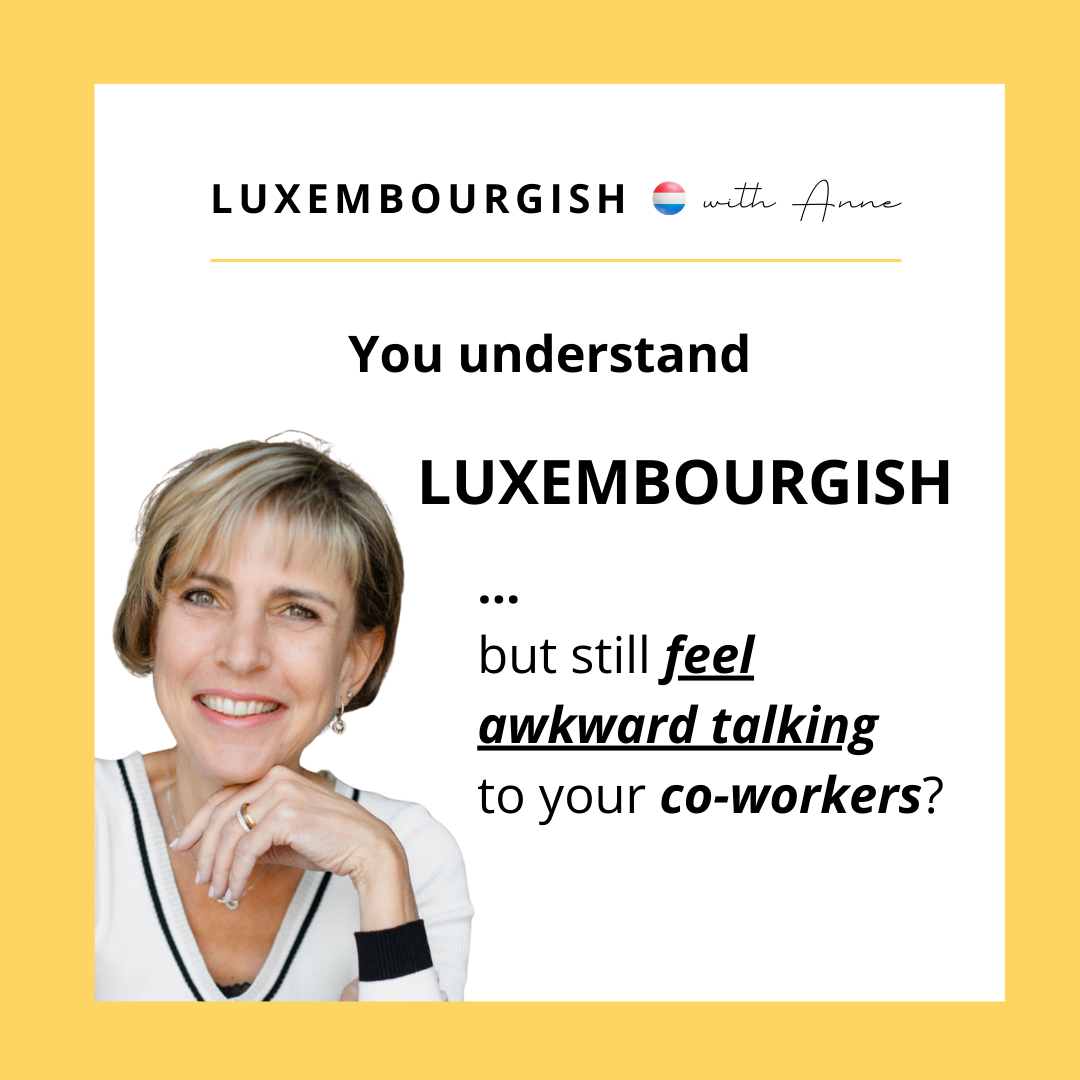This is part 2 of a series of 10 Must-Know phrases Luxembourgish native speakers use and that you can use in every day life at work, at social gatherings, with your family. They will help you to talk with much more ease and help you as well to understand native speakers.
I recommend that you read first part 1 of 10 Luxembourgish Must-Know phrases.
Listen to the video of this lesson so to learn how native speakers pronounce these phrases and to improve as well your listening skills!
Let’s get started:
1. Hutt dir / Hues du {+ point in time} eppes vir? – Do you have any plans for {+point in time}?
When you talk to several people or a couple of friends use Hutt dir …? and when talking to one person you know well or in an informal situation use Hues du …?
So choose a point in time to ask in a quick way about another person’s schedule. Don’t forget eppes (literally something) in your question!
⇒Hutt dir de Weekend eppes vir? – Do you have any plans for this weekend?
⇒Hues du muer den Owend eppes vir? – Do you have any plans for tomorrow evening?
⇒Hues du an der Mëttespaus eppes vir? – Do you have any plans for the lunch break?
⇒Hutt dir e Sonndeg schonn eppes vir? – Do you have any plans for Sunday (already)?
2. Wat hues du gesot? – What did you say?
Native speakers use this all the time. So use this question to ask about something another person just said in a conversation which you couldn’t catch, understand or which you misheard. It is more polite than just saying Wat?
In a formal situation you should use the formal form of you:
⇒ Wat hutt Dir gesot? – What did you (formal) say? Or a more polite way would be:
⇒ Kënnt Dir dat widderhuelen, w.e.g.? Ech hunn net alles verstanen. – Could you repeat that please? I didn’t understand everything.
3. Dat ass awer schued! – What a pity!
This is frequently used when someone think something is really a pity. Of course you could as well simply use the short form: Schued! But if you want to emphasize that something is really a pity then use the long form. As in this example:
-Gees du de Mëtteg mat an de Restaurant? – Are you going (with us) to the restaurant at noon?
-‘t deet mer leed, mee ech hunn haut keng Zäit. – Sorry, but I don’t have time today.
–Dat ass awer schued! – That’s really too bad / What a pity!
4. Ech hunn {+ body part} wéi. – My {+ body part} hurts
This is an natural expression to use when you are not feeling well.
⇒ Ech hunn de Kapp wéi. – My head hurts.
⇒ Ech hunn de Réck wéi. – My back hurts.
⇒ Ech hunn de Bauch wéi. – My stomach hurts.
5. Et ass mir net gutt. – I don’t feel so good.
Use this expression if you don’t want to specifically say like “Ech hunn de Bauch wéi” or “Ech hunn de Mo wéi” etc. Et ass mir net gutt tends to be used more for like stomach problems. We say et ass mir net gutt when we actually feel bad or sick very suddenly. For example when you ate too much for lunch or ate something bad. Use it when you feel a sudden and unpleasant feeling in your body.
Naturally it sounds like this:Watch the Video to learn the pronunciation!
6. Wat heescht dat? – What does that mean?
This is a great way to use when you don’t understand something that is written or the background information of a situation and you need a further explanation. Or someone said something and that person hasHe just gone and you can’t ask “Wat hues du gesot?” and so you ask someone else by saying Wat heescht dat?
Naturally it sounds like this: Wat heeschdat? You don’t hear the final -t
7. Ech muss {+location} goen. – I need to go to {+location}.
Here we have the ver mussen (to have to / to must). This is used to talk about your daily tasks you need to do but as well if you need to go to the toilet!
⇒Ech muss op d’Toilette goen. – I need to go to the toilets.
⇒Ech muss nach op d’Bank goen. – I still need to go to the bank.
⇒Ech muss akafe goen. – I have to go shopping.
⇒Ech muss meng Kaz bei den Déierendokter siche goen. – I have to pick up my cat at the vet.
8. Ech brauch + something – I need + something?
So I need is ech brauch. We have the modal verb brauchen which is followed by an accusative object or phrase.
⇒Ech brauch méi Zäit. – I need more time.
⇒Ech brauch en neie Mantel. – I need a new coat.
⇒Ech brauch deng Hëllef. – I need your help.
⇒Ech brauch näischt. – I don’t need anything.
9. Ech soen dir / Iech Bescheed. – I’ll let you know
Let’s say that you are invited to a party and your friend is asking you:
➤Kënns du op meng Party? – Are you coming to my party?
and if you haven’t made up your mind yet, then your answer could be:
➢Ech soen dir muer Bescheed. – I’ll let you (informal) know tomorrow.
⇒Ech soen Iech esou séier wéi méiglech Bescheed. – I’ll let you (formal) know as soon as possible.
⇒Ech soen dir Bescheed, wann ech nach eppes brauch. – I’ll let you know, if I still need something.
10. Bei eis ….. – At our house
Use bei eis when you want to express at our place, at our house or more generally in our country / area / city.
⇒Bei eis gëtt et sonndes ëmmer Paangecher. – We are always having pancakes on Sundays (at our house)
⇒Kënns du muer bei eis? – Are you (informal) coming to our house tomorrow?
⇒Bei eis ass et sonndes moies ganz roueg. – It is very quiet in our area on Sundays.
I hope you liked it and found it useful. And …. why not sharing this lesson with your friends:-)
If you want to learn Luxembourgish from scratch but you don’t have time to attend classes then this my online course is for you!




